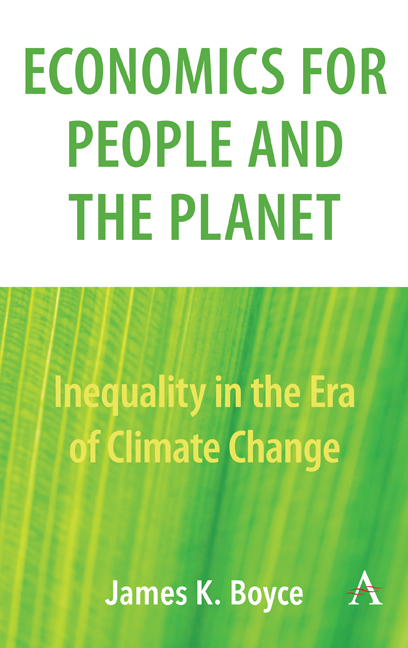Book contents
- Frontmatter
- Contents
- List of Illustrations
- Acknowledgements
- Part I Rethinking Economics and the Environment
- Part II Environmental Injustice
- Part III Climate Policy
- Chapter 17 Smart Climate Policy
- Chapter 18 Investment in Disadvantaged Communities
- Chapter 19 Dividends for All
- Chapter 20 Truth Spill
- Chapter 21 Four Pillars of Climate Justice
- Chapter 22 The Perverse Logic of Offsets
- Chapter 23 Climate Policy as Wealth Creation
- Chapter 24 The Carbon Dividend
- Chapter 25 Keeping the Government Whole
- Chapter 26 Air Quality Co-benefits in Climate Policy
- Chapter 27 Climate Adaptation: Protecting Money or People?
- Chapter 28 Forging a Sustainable Climate Policy
- Notes
- Publication History
- Index
Chapter 27 - Climate Adaptation: Protecting Money or People?
from Part III - Climate Policy
Published online by Cambridge University Press: 12 February 2019
- Frontmatter
- Contents
- List of Illustrations
- Acknowledgements
- Part I Rethinking Economics and the Environment
- Part II Environmental Injustice
- Part III Climate Policy
- Chapter 17 Smart Climate Policy
- Chapter 18 Investment in Disadvantaged Communities
- Chapter 19 Dividends for All
- Chapter 20 Truth Spill
- Chapter 21 Four Pillars of Climate Justice
- Chapter 22 The Perverse Logic of Offsets
- Chapter 23 Climate Policy as Wealth Creation
- Chapter 24 The Carbon Dividend
- Chapter 25 Keeping the Government Whole
- Chapter 26 Air Quality Co-benefits in Climate Policy
- Chapter 27 Climate Adaptation: Protecting Money or People?
- Chapter 28 Forging a Sustainable Climate Policy
- Notes
- Publication History
- Index
Summary
Will climate adaptation be a commodity distributed on the basis of purchasing power or a human right for all?
At the December 2014 international climate talks in Lima, Peru, melting glaciers in the Andes and recent droughts provided a fitting backdrop for the negotiators’ recognition that it is too late to prevent climate change altogether, no matter how fast we ultimately act to limit it. We now confront an issue that many once hoped to avoid: adaptation.
Adapting to climate change will carry a hefty price tag. Sea walls are needed to protect coastal areas against extreme floods, such as those in the New York area when Superstorm Sandy struck in 2012. We need early-warning and evacuation systems to protect against human tragedies, like those caused by Typhoon Haiyan in the Philippines in 2013 and by Hurricane Katrina in New Orleans in 2005.
Cooling centers and emergency services must be created to cope with heat waves, such as the one that killed 70,000 people in Europe in 2003. Water projects are needed to protect farmers and herders from extreme droughts, like the one that gripped the Horn of Africa in 2011. Large-scale replanting of forests with new species will be needed to keep pace as temperature gradients shift toward the poles.
Because adaptation won't come cheap, we must decide which investments are worth the cost.
A thought experiment illustrates the choices we face. Imagine that without major new investments in adaptation, climate change will cause world incomes to fall in the next two decades by 25 per cent across the board, with everyone's income going down, from the poorest farmworker in Bangladesh to the wealthiest real estate baron in Manhattan. Adaptation can cushion some but not all of these losses. What should be our priority: reduce losses for the farmworker or the property baron?
For the farmworker, and for a billion others in the world who subsist on about $ a day, this 25 per cent income loss will be a disaster, perhaps spelling the difference between life and death. Yet, in dollars, the loss is just 25 cents a day.
For the real estate baron and other ‘one-percenters’ in the United States with average incomes of about $2,000 a day, the 25 per cent income loss would be a matter of regret, but not a threat to survival.
- Type
- Chapter
- Information
- Economics for People and the PlanetInequality in the Era of Climate Change, pp. 133 - 134Publisher: Anthem PressPrint publication year: 2019



